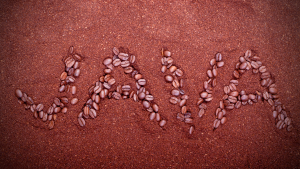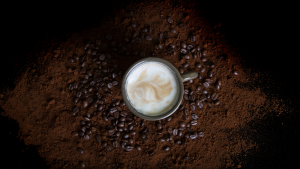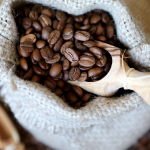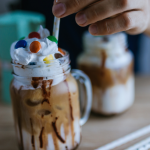What Is Java Coffee?

Java Coffee is what many people consider to be the perfect coffee. It has a robust and rich flavor that is not too bitter, nor does it have an unpleasant aftertaste. Java also has less caffeine than other monsooned coffee beans on average, making it easier to drink throughout the day without feeling jittery or anxious.
The History of Java Coffee
Coffee called java originated in Indonesia and was originally called “Kopi Jawa.” The name was eventually changed because most foreigners couldn’t pronounce it correctly. Today there are many different java beans, including Sumatran, Indian Monsooned Malabar, Sulawesi Toraja Dark Roast, Bali Blue Mountain, Jamaican Blue Mountain beans, and Java Arabica coffee.
Calories Level in Java Coffee
Java coffee generally has fewer calories than other types of coffee. A 16-ounce cup of java coffee with 2 tablespoons of skim milk and no sugar has approximately 5 calories. A 16-ounce cup of cappuccino made with 2 percent milk and no sugar has about 100 calories, and a 16-ounce cup of café mocha made with 2 percent milk and whipped cream has approximately 290 calories.
Type of Roast for Java Coffee
There are three different roasts that can be used for java coffee – light, medium, and dark. The light roast will have a milder flavor, while the dark roast will have a richer flavor. The type of roast you choose will depend on your personal preferences.
Brewing Java Coffee

When brewing java coffee, it is important to use freshly ground arabica beans. You should also use filtered water to make sure that your coffee is not bitter. If you are using a drip coffee maker, you should use about 2 tablespoons of mocha java blend for every 6 ounces of water. If you are using a French press, you should use about 1 tablespoon of ground for every 4 ounces of water.
Serving Suggestions for Java Coffee
Java coffee can be enjoyed on its own or with a variety of foods. It goes well with breakfast foods such as eggs and bacon, as well as pastries and desserts. Mocha java coffee can also be used in recipes for cakes, cookies, and other sweet treats.
Nutritional Value of Java Coffee
Java coffee robusta beans are a good source of antioxidants and have been shown to offer some health benefits from coffee trees. It can help to protect against heart disease and cancer, and it may also help to improve cognitive function. Java coffee is also a low-calorie beverage, so it can be a good choice for those who are trying to lose weight or maintain a healthy weight.
Advantages of Drinking Java Coffee
- It has a robust and rich flavor that is not too bitter, nor does it have an unpleasant aftertaste.
- Java also has less caffeine than other coffees on average, making it easier to drink throughout the day without feeling jittery or anxious.
- It generally has fewer calories than other types of coffee.
- Java coffee is a good source of antioxidants and has been shown to offer some health benefits. It can help to protect against heart disease and cancer, and it may also help to improve cognitive function.
Disadvantages of Drinking Java Coffee
- Some people may find that the flavor of java coffee is too strong or overpowering.
- Java coffee is not as widely available as other types of coffee, so it may be more difficult to find coffee shops.
- Java coffee can be more expensive than other types of coffee.
How to Make Java Coffee
To make java coffee, you will need:
- 1 cup of water
- 2 tablespoons ground java coffee beans
- 1 teaspoon sugar (optional)
Instructions:
- Boil the water in a pot or kettle.
- Pour the boiling water into a French press.
- Add the ground coffee beans and stir.
- Put the lid on the French press and let it steep for 3-5 minutes.
- Slowly push down on the plunger to filter the coffee grounds from the liquid.
- Pour the coffee into a mug and add sugar if desired.
How to Store Java Coffee
Java coffee beans should be stored in an airtight container in a cool, dark place. Once the beans are ground, they should be used within 2 weeks for the best flavor. If you need to store ground coffee for longer than 2 weeks, it can be kept in the freezer.
Tips and Tricks
- If you want a stronger coffee, use more grounds. If you want a weaker coffee, use fewer amounts.
- French press coffee is usually more concentrated than drip coffee, so you may want to add more water if you are using a French press.
- Java coffee beans can be roasted at home if you have a popcorn popper. Just put the beans in the popper and heat until they are dark brown. Be sure to stir often so that they don’t burn.
- If you want to make iced coffee, brew a double batch of concentrate and store it in the fridge. When you are ready to drink it, just add water or milk and ice.
- To make a fancy coffee drink, try adding a shot of espresso to your java coffee.
- If you want to make a decaf version, just use decaf coffee beans. You can also use water that has been brewed with coffee grounds and then strained to remove the caffeine.
Conclusion
Java coffee is a versatile beverage that can be enjoyed on its own or with a variety of foods. If you are looking for a delicious and healthy coffee option, java coffee may be the perfect choice for you.
Related Articles
Bodum Brazil 8-Cup French Press Coffee Maker Review
Hamilton Beach Single Serve Coffee Brewer
Nescafe Taster’s Choice House Blend Instant Coffee
Black Insominia Coffee Filter Ground

 Previous Post
Previous Post Next Post
Next Post